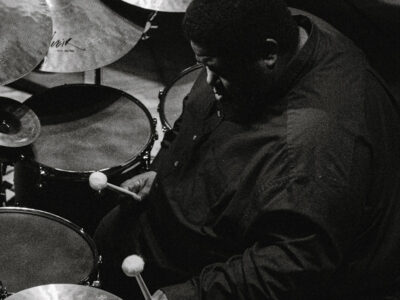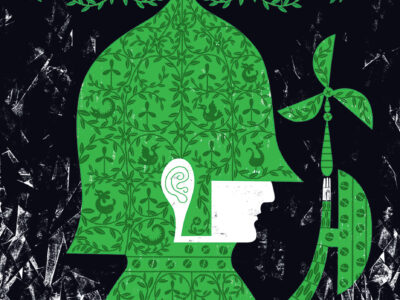
Being a linguist didn’t necessarily give Dr. Charles Yang an edge when his son, Russell, uttered his first mysterious word, wuckoo. (Best-guess translation: truck.) Still, Yang, assistant professor of linguistics, has some insights that might surprise the average parent trying to decode toddler talk: For one thing, their grammar is already perfect in a biological sense.
“The errors in their language are neither random, as if they were scrambling words at will, nor all alike, as if they result from some developmental bottleneck that puts complex sentences or big words out of children’s reach,” he writes in his recent book, The Infinite Gift: How Children Learn and Unlearn the Languages of the World (Scribner). “The errors are in fact grammatical—in languages from different places or even times.”
Language learning, then, is a process of unlearning all the other grammars that are incompatible with the child’s linguistic environment—a process that Yang likens to natural selection.
Yang previously taught linguistics and psychology at Yale and earned his Ph.D. in computer science at MIT, studying in its artificial-intelligence laboratory. His book, written for a lay audience, imparts a sense of humor and wonder about the complex enterprise of children’s language acquisition and lays out the building blocks of modern linguistics, including the revolutionary theory of Noam Chomsky C’49 G’51 Gr’55 Hon’84 [“Speech!,” July/August 2001] that humans are born with an innate foundation for language, or universal grammar.
Yang came up with what he calls his “Darwinian footnote” to Chomsky’s theory of language and learning during a grad-school field trip to the American Museum of Natural History, jotting down a mathematical model for grammar competition with the only available writing instrument, a brown crayon.
Freelance writer Susan Frith talked with Yang in a phone interview after he joined Penn’s faculty last fall.
In your book you state that we all spoke Chinese when we were little.
Absolutely. That’s a pattern that shows up in every English-learning child. For example, a child will say, “Tickles me.” The subject is missing, which would be ungrammatical for English (though not for Chinese) and which is not something the child can possibly pick up from the parents. This kind of pattern occurs over and over.
Describe what you mean when you talk about natural selection in language acquisition.
A young child may use grammatical forms that might be possible for German or Chinese or Hindi, but cannot come from English-speaking parents … Then over a span of a couple years you can see these gradually decline until the child starts to talk like a perfect English speaker. It’s a perfect analogy to biological evolution. You find the fitter form is going to take over the less fit form.
So what happens? The child says something and gets a blank look from their parents?
They’re only going to hear the data from one grammar. But in many cases, some non-English grammar is consistent with a good deal of what a child hears. Take Chinese: They hear something like John saw Bill. That in no way contradicts Chinese grammar, which doesn’t forbid the use of the subject. For the overwhelming amount of things a child hears, the two grammars are indistinguishable. Under most conditions two genes are equally fit, but there are cases where one gene is slightly fitter than another. In the case of language acquisition, maybe the advantage of one “gene” over another only shows up when it rains. When the kid hears something like it rains, in this case it doesn’t mean anything. It’s just a generic placeholder. Those kinds of sentences would give English grammar an advantage, because those sentences are incompatible with Chinese grammar.
What are the implications for later acquisition of a foreign language?
There’s a critical window in which other grammars come in fairly naturally … It doesn’t mean you can’t learn a second language quite well, but it seems to be qualitatively different than the first language learned. It’s far more effortful.
You mention a study in which English-speaking students were tricked into differentiating Hindi and Salish consonants by telling them they were listening to the sound of a dripping faucet.
That’s interesting because it seems to tell us that once we learn language, we tend to perceive the world in a somewhat language-centric way, so those are sounds we normally wouldn’t be able to hear because they’re sounds from some foreign language. It shows that it’s not that your ears are going, or losing their sensitivity, but that something happens to the cognitive system which would treat linguistic signals in a way that favors the native language.
Does being a linguist give you an advantage in decoding your own child’s speech?
Everything is conceptual. If the child is saying ga-ga, you just don’t know what they’re talking about. If you’re a linguist, you can figure out some more natural or frequent ways of synthesizing speech, but the child may [do it] with a great deal of variation in the beginning. In my book I have a whole chapter on my son’s first word, wuckoo.
In the case of wuckoo for truck, when they have a string of consonants like tr, that’s very difficult to say for very young children. They almost always drop or simplify from multiple consonants to one consonant … The koopart is interesting because it’s not the child making the word simpler. [He’s] actually making it more complex by adding something to it. But that’s a natural way of speaking, going back to the babbling days when the child was saying ba-ba—almost always an alternation of the consonant and vowel.
Are parents too obsessed about their children learning to talk?
On the one hand, I think that, other than some cases where there’s a genuine problem and the child has trouble learning, every child will learn just fine. On the other hand, I don’t want to leave the impression that nature is going to take over. There is well-documented evidence that when children are spoken to more often, they learn a greater vocabulary. I think it’s important to talk to children, but I don’t think any special effort is needed to make language more learnable, or [to create] some homebrew device to speed up the process. Besides, a lot of studies show that children consistently resist the corrections. Both my wife and I are linguists, and we know it doesn’t help at all, but when my son says, “I holded the book,” I say, “You mean, you held the book.”
How much has our understanding of children’s language acquisition changed since Chomsky developed his theory of universal grammar?
Prior to that there was no theory of language learning at all, and now we have a fairly elaborate and reasonably accurate picture of what a child is doing. This is essentially the invention of a field, which now has many important implications in many other fields.
There is still a little bit of a disconnect between what scientists of language learning know and what practitioners out there are doing. If we know how normal language development works, can we figure out how to identify children who may have problems with language and come up with effective ways of correcting those problems? I’d like to see that.
Are some language disorders misdiagnosed?
There is the potential for misdiagnosis. In many cases of language-learning assessment, the errors are generally taken in comparison to some accepted norms of speech. That’s always standard American English, and it fails to take into account various dialectic variations, such as African-American English. African-American children are over-diagnosed with language-learning disabilities.
So your son is now 6 1/2. What’s he talking about now?
Star Wars and Nintendo Wii.
Is he articulating his needs for these toys effectively?
Very effectively. He’s getting his way.




